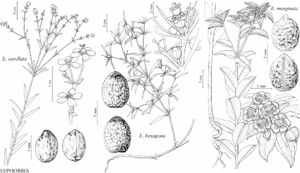Euphorbia marginata
Fl. Amer. Sept. 2: 607. 1813.
Herbs, annual, with taproot. Stems erect, unbranched or branched, 30–85(–150) cm, pilose or glabrous. Leaves alternate; stipules 0.1–0.3 mm; petiole 0.2–3 mm, glabrous or minutely pilose; blade broadly ovate to elliptic, 32–62(–82) × 18–28(–52) mm, base rounded to cuneate, margins entire, often white on distal leaves, apex acute, rarely mucronate, surfaces glabrous; venation obscure, only midvein conspicuous. Cyathia in terminal pleiochasia, dichasial bracts narrowly elliptic to oblanceolate with conspicuous white margins; peduncle 1.8–2.7(–22) mm, densely pilose. Involucre campanulate, 2.2–3.5 × 1.3–2.3 mm, margin between glands deeply divided into fringe of fimbriate lobes, pilose; glands 4–5, green to greenish yellow, reniform to subcircular, 0.7–1.1 × 1–1.6 mm; appendages white, orbiculate, 1.5–2.7 × 1.9–2.9(–3.6) mm, entire. Staminate flowers 30–70. Pistillate flowers: ovary pilose; styles 1–2.5 mm, 2-fid 1/2–2/3 length. Capsules oblate, 3–5 × 3.5–7.5 mm, moderately to densely pilose; columella 3–4.1 mm. Seeds orange-tan to gray, ovoid, 3.7–3.9 × 3–3.3 mm, rugose, with 2 transverse ridges (one dark orange to brown, other inconspicuous); caruncle absent. 2n = 56.
Phenology: Flowering and fruiting summer–fall.
Habitat: Disturbed areas and grasslands.
Elevation: 0–1700 m.
Distribution

Man., Ont., Que., Sask., Ark., Calif., Colo., Conn., Ill., Ind., Iowa, Kans., La., Md., Mass., Mich., Minn., Mo., Mont., Nebr., N.H., N.Mex., N.Y., N.C., Ohio, Okla., Pa., R.I., S.C., S.Dak., Tenn., Tex., Utah, Va., W.Va., Wis., Wyo., c, s Mexico.
Discussion
Euphorbia marginata is native to the central United States. The type specimen was collected by Meriwether Lewis along the Yellowstone River in southern Montana in 1806, and it has been reported to be native as far south as Arizona, New Mexico, and Texas, and as far east as southern Minnesota, western Iowa, and Missouri (G. Yatskievych 1999–2013, vol. 2). It is presumably naturalized outside of this area. Euphorbia marginata is widely cultivated as an ornamental for its showy, white-margined distal leaves, and it can escape locally.
Selected References
None.
